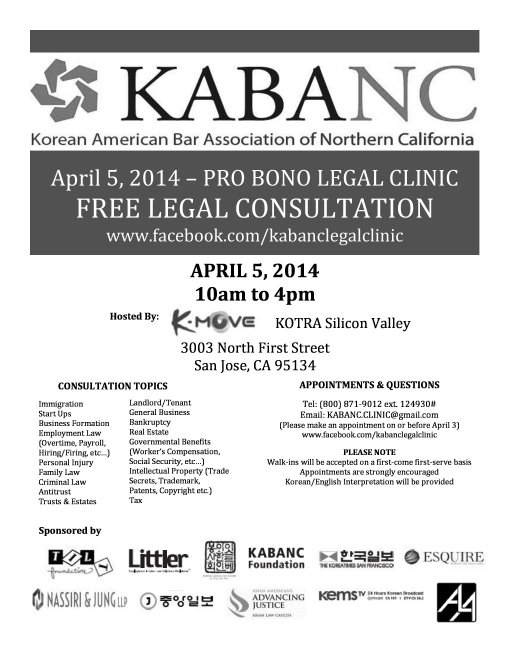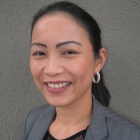Many successful people donate money to charitable organizations. Fewer, however, give of their most precious resource: their time.
Eugene Ryu, partner at the prestigious employment law firm Littler Mendelson, gives plenty of both. He has served on the Board of Directors for the Korean American Bar Association of Northern California (KABANC) for over five years, where he leads the pro-bono committee that organizes a free law clinic twice a year.
“We help everybody,” says Ryu. “But originally, the clinic was focused on the first-generation, elderly Korean community who were having language difficulties.”
In its early days, the clinic primarily addressed immigration issues. Today, clients of all ethnicities walk in with other legal questions ranging from family law to small business practices -- including hopeful entrepreneurs trying to launch start-ups.
The clinic benefits not only the community, but also the law students and attorneys who volunteer. For law students, interacting with clients provides real-life experience the classroom cannot provide. And for attorneys, the satisfaction they gain from mentoring the next generation of lawyers provides a brighter outlook on the future.
“It’s not just for our parents’ generation that we [KABANC] spend so much time doing this stuff,” says Ryu. “It’s also for our kids, to show them, ‘Look, you can do anything, you can be active in the community, you can be Asian and [...] do whatever you want to do. You don’t have to adhere to any kind of preconceptions, stereotypes, or misconceptions.’”
From a young age, Ryu had to banish any sense of self-consciousness or insecurity in order to help his first-generation immigrant parents. Long before he graduated from UC Berkeley with a double major in ethnic studies and mass communications, and from UC Hastings with a J.D., Ryu had adult responsibilities to bear -- even as a young 10-year old. When asked why he pursued employment law, Ryu says: “It was a pretty natural fit [...] my parents were small business owners [and] I had to help them with all this random stuff relating to their business by communicating in English on their behalf.”
Ryu acknowledges that his experience is likely a common one among children of immigrant parents. But unlike others who may have felt burdened by the need to serve as their parents’ spokesperson (consider, for example, Amy Tan’s essay “Mother Tongue,” in which she discusses a similar experience in a rather ambivalent tone), Ryu always felt up to the challenge.
“I was totally okay with it. I would negotiate things for my dad, and I remember having to call credit card companies and banks for my mom [and] do all these different things,” he says. “I joke about this when I say my parents were my first clients, but they kinda were.”
Ryu was drawn to employment law because it required him to work directly with people. “I have pretty personal relationships with all of the clients that I work with,” he says. “I understand that their business is their livelihood, and that problems need to be fixed in order for their business to succeed. I get it -- and it kind of feels [like when] I would help my parents deal with the growing pains of their own business, being able to commiserate and understand what that’s like.”
Ryu grew up in San Diego, CA with his parents and younger sister at a time when very few Asian American residents lived there. To help their children form a stronger Korean identity, Ryu’s parents drove the family to a Korean church over an hour away on at least a weekly basis. “It wasn’t at all about the religion part ... it was about them just wanting us to hang out with other Korean kids,” he recalls.
While listening to Ryu speak, I try hard to ignore the cognitive dissonances resounding in my brain as I ponder Ryu’s seemingly contradictory qualities. For one thing, he looks very young. More like a 1L student wearing a pinstripe suit borrowed from his father than a senior partner at a big-deal law firm. Second, he speaks in an even, laid-back, deep and very kind voice -- not the over-assertive, brash lawyer-type voice I might have expected from a highly successful attorney. And, perhaps most notably, the guy is just one down-to-earth kind of dude, keenly honest and self-aware.
As our conversation winds down, Ryu asks Hyphen to reach out to others for help. In addition to volunteers and free publicity, KABANC needs a permanent space to host its clinics. KABANC is hoping that securing a permanent space at no cost will allow their clinic to draw in a steadier, larger crowd and help more people in the community. If you, Dear Reader, can help in any way, please email me at abigail[dot]licad[at]hyphenmagazine[dot]com.
The next KABANC clinic is scheduled for April 5, 2014, from 10 am to 4 pm, at the Korea Trade-Investment Promotion Agency (KOTRA) offices (3003 North First Street, San Jose, CA 95134). Please help spread the word, and help Ryu and KABANC fight the good fight.
To make an appointment
Phone: (800) 871-9012 ext. 124930#
Email: KABANC.CLINIC [at] gmail.com
Facebook: www.facebook.com/kabanclegalclinic











Comments